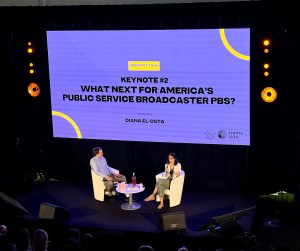Think of it as the Marché du Film, except just for documentaries.
That’s one way to picture Sunny Side of the Doc, the annual gathering of some of the top buyers and sellers of nonfiction content around the world. The four-day event got underway Monday in La Rochelle, the historic port city on France’s Atlantic coast.
Much like the Marché du Film in Cannes, Sunny Side’s exhibition hall presents a maze of booths where countries and companies alike do business along the water: Arte, Canal+, Mediawan, NHK, Terra Mater Factual Studios, Newen Connect, Al Jazeera, National Geographic, PBS, BBC, and more; there’s also space for delegations from China, Chile, Brazil, Nigeria, Australia, and other countries.
Diana El-Osta of PBS speaks at a keynote at Sunny Side of the Doc. At left is moderator Nick Edwards.
Matthew Carey
During a keynote address Tuesday, Diana El-Osta, senior director, multiplatform development and programming at PBS, noted the challenging environment for so many stakeholders in documentary.
“I think there’s pretty broad recognition that we’re in the middle of a moment of contraction across the industry,” El-Osta said. “We’re seeing that across broadcasters — we’re seeing layoffs. A lot of the media landscape is grappling with what the future will look like and grappling with our business models and how do we remain sustainable.”
Co-production has become an increasingly crucial model to finance and create documentary content. Sunny Side plays a key role bringing collaborators together in one space.
“Co-pros are so important to us and that’s one of the reasons we’re here at Sunnyside is to meet our various partners and to meet producers and to build those collaborations,” El-Osta said. “I do think you’re seeing that whereas a year or two ago, you only needed two or three broadcasters to come together to fund a production, now you’re seeing that you need four or five broadcasters to come together to fund a production.”
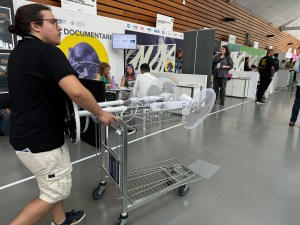
Fans are brought in to cool the Sunny Side space on a warm day.
Matthew Carey
A sizeable Chinese delegation has come to Sunny Side seeking co-production of several documentary projects, including the second season of the environmental-themed series Neu Earth. At a luncheon Monday, producers showed footage from Neu Earth 2: Skyline, which is expected to be completed in November of this year. It’s a production of China Intercontinental Communication Center and Beach House Pictures Pte Ltd. (the latter accompany was acquired earlier this year by Freemantle).
“With ‘Green Cities’ as the theme,” notes a synopsis, “Neu Earth 2: Skyline highlights new technologies, materials, designs, and concepts adopted at China, the United States, the United Kingdom, Italy, South Korea, Singapore, the Netherlands, and other countries in promoting the green city construction, and describes the opportunities and challenges faced in urban green development.”
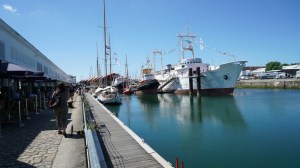
Sunny Side of the Doc takes place at L’Espace Encan, along a quai in La Rochelle, France.
Matthew Carey
Elsewhere, Newen Studios, with bases of operation in Europe, the U.S. and Canada, is bringing its most diverse slate of content ever to Sunny Side. Among its films are Democracy Noir, a documentary directed by Oscar-nominated filmmaker Connie Field about Hungary’s strongman Victor Orbán, that premiered at CPH:DOX in Copenhagen, and the history-themed Forgotten Heroines of the French Revolution produced by Capa and directed by Émilie Valentin and Mathieu Schwartz, a film originally commissioned by France’s Arte.
“After a hugely successfully Sunny Side last year, the Newen Connect team is excited to be representing an impressive slate of films that cover a wide range of subjects that take in both fascinating historical topics as well as contemporary issues,” Chloé Persyn, head of factual distribution at Newen Connect, said in a statement. “Made with passion and integrity by some of the most highly regarded film makers in this discipline, I’m excited to introduce them to international buyers and bring them to global audiences.”
Numerous video and photos are agencies are represented in Sunny Side’s exhibition hall, including CNN Images, Pathé, Associated Press, Getty Images, Alamy, and Shutterstock.
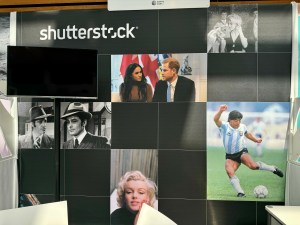
The Shutterstock booth at Sunny Side of the Doc.
Matthew Carey
“Shutterstock in the industry is still known more for great imagery and great video. And recently there has been more acquisitions of historic and iconic collections to widen the portfolio,” Shutterstock’s Vanessa Rubino told Deadline. “Sunny Side is important to change the brand’s perception and say, ‘Oh, I didn’t know Shutterstock had the Life [magazine] collection, which is exclusive and used to be many years ago with Getty Images.”
Along with educating customers about Shutterstock’s collection of editorial images, which are of particular interest to documentary makers, Rubino says the company attends Sunny Side to scout for potential collaborations. “We are interested to know what our clients have in the pipeline, what topics are they covering. Is it historic? Is it wildlife? Is it nature?” she said. “What is the trend or what’s in the pipeline so that we can proactively come up with ideas and support [a project]. Anything that can’t be produced because of budget or resources and archive, it makes sense to bring Shutterstock into the conversation.”
Sunny Side’s pitch sessions, described as “the most highly anticipated and popular part of the event,” continued Tuesday with pitches in two categories: Global Issues and Arts & Culture. Winning pitches in each of seven categories earn a prize of €3,000.
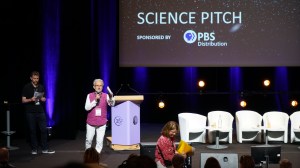
Sunny Side’s Mathieu Béjot (with mic) opens the first pitch session.
Matthew Carey
Mathieu Béjot, Sunny Side’s head of strategy and development, opened the pitching sessions on Monday in the category of Science. “We have six incredible projects that are going to be pitched,” he told the audience in the Sunny Side auditorium space. “We have great projects. I’m sure they’re going to take you aback.”
Teams representing the projects got seven minutes total to present their proposals (music chimed over a p.a. system to signal when it was time to wrap). A distinguished panel including producers from PBS’s NOVA and the CBC evaluated the pitches. The full list of winners will be announced on Thursday, the closing day of the event.
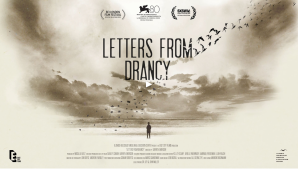
‘Letters from Drancy’
East City Films
Sunny Side is making space for discussions of new opportunities for distribution of XR/immersive content. At a keynote on Wednesday, award-winning Australian filmmaker Emma Roberts will discuss her work, including Gondwana, “an explorable, free-roaming representation of the Daintree Rainforest in Far North Queensland, Australia.” Later on Wednesday, Ubisoft’s Amy Jenkins, Philippe Rivière of Art Explora, Marianne Lévy-Leblond of Arte and filmmaker Darren Emerson will discuss new developments within XR and immersive. Arte is devoting more of its energy to gaming, exploring fiction, nonfiction and hybrid storytelling. Ubisoft is partnering with filmmakers to leverage historical content created for its enormously popular Assassin’s Creed game. And Emerson will discuss his VR film Letters from Drancy, a remarkable piece made for the Illinois Holocaust Museum in Chicago that focuses on the memories of Marion Deichmann. As a child in Paris during World War II, Marion saw her mother grabbed by French collaborators of the Nazis, who eventually dispatched Alice Deichmann to Auschwitz.
“Central to our narrative is the formidable Marion Deichmann, a Holocaust survivor whose story traces a harrowing journey through Nazi-occupied Paris,” a description of the film observes. “Far from being just another retelling, our film endeavors to provide audiences with an intimate understanding of her lived experiences and trials.”

